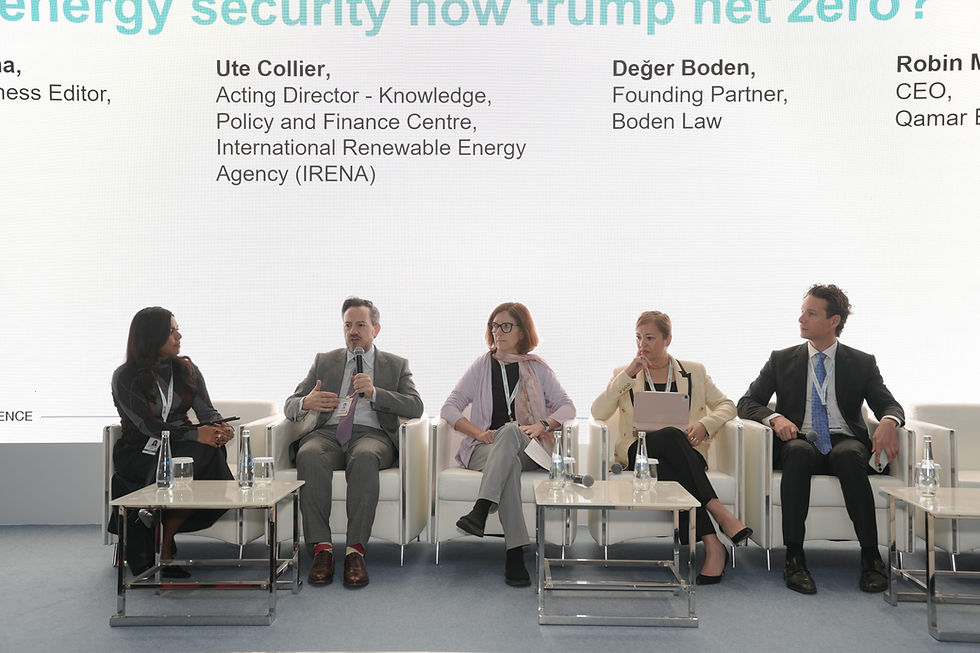Cityscape Global: Panel on Building a Greener Future For All
- Ethan Fulton

- Oct 3, 2023
- 3 min read
Updated: Oct 9, 2023
As the global dialogue on sustainability intensifies, the hospitality and leisure real estate sectors are increasingly home to opportunities for innovation. Jeffrey Beyer moderated a high-level panel at Cityscape Global in Riyadh to explore the evolution of the sector in the Gulf.

The Cityscape panel included:
Jeffrey Beyer - Managing Director, Zest Associates
Kerem Cengiz - MENA Managing Director, LWK + Partners
Fawaz Al Harbi - Director of Development, ROSHN
1) "Sustainable development" encompasses so much.
The UN Bruntland Report, called "Our Common Future", first coined the term "sustainable development" in 1987. Since then, the UN has established its 17 Sustainable Development Goals that range from environmental conservation to economic growth to food security. Urban development and construction can align its objectives through SDG #11: Sustainable Cities and Communities.

2) Development should be rooted in sustainability frameworks.
The Kingdom of Saudi Arabia is committed to reaching net-zero carbon emissions by 2060. It has established a "Saudi Green Initiative" that focuses on the energy transition and conserving biodiversity while planting 10 billion trees to "green the desert". Saudi Arabia's plans also exist within its broader Vision 2030 diversification framework.

3) Sustainable building begins at the design phase.
The construction sector is "notoriously conservative" and clean-tech innovations should be signaled as a priority beginning at the design phase and maintained all the way through construction, operations and decommissioning. Upfront capital costs of innovation are sometimes higher for green products than for environmentally damanging ones, but they deliver value over the lifetime of a building. Mechanisms need to be developed to align lifetime incentives across the value chain, from design to construction to building occuptation.
4) Energy and business management should work together and leverage the ESCO model.
Real estate firms have an opportunity to use their facilities as 'living labs' for innovation. They can test new ideas then scale up successful ones to fit larger portfolio projects, and signal a commitment to sustainability across audiences. Sometimes, delegating energy efficiency to specialist firms like Energy Service Companies (ESCOs) is the best way to achieve energy and carbon savings whilst ensuring comfort and performance. Building managers can outsource the energy management to ESCOs, who provide energy audit, financing and solution services.

5) Voluntary and regulatory sustainability measures both have value.
The Dubai Sustainable Tourism Initiative was established as a public-private partnership to embed the principles of sustainability in all aspects of the tourism sector. It started with capacity building to raise awareness of the benefits of sustainability and the costs of inaction. It formed a community in the hospitality sector around sustainability. It produced free guidance, templates and technical support to encourage uptake of sustainable practices and encouraged voluntary measurement and disclosure. Finally it included a minimum level of sustainability performance as a license condition, enforcing standards alongside extensive support. The initiative supported 600 hospitality establishments to reduce absolute emissions, food waste, water consumption and many other metrics, and report on performance using a harmonized framework.
6) Sustainable tourism includes both social and environmental consideration.
As Saudi Arabia works to opens its borders to tourists, it will experience an influx of people. It is important to ensure that a balance is struck between tourism and local preferences. Venice, for example, has served as a poster child for overtourism, squeezing out the local population. In response, the city has implemented a tourist tax for day trips of €5 starting in 2024. Machu Picchu in Peru has also implemented tourist limitations due to concerns about crowding's impacts on the sensitive rainforest ecosystem. Maintaining a social and ecological license to operate is critical to ensuring long-term sustainability.
Summary
The Cityscape Conference on Riyadh provided an international forum for key stakeholders in the future of real estate investments and developments. The event's panels provided rich insight into current trends and topics in sustainability as well as Saudi Arabia's evolution in culture and hospitality. With coordinated efforts that bridge the public and private sector, the real estate industry can unlock its full potential in making the GCC's growing tourism sector a contributor towards the region's transition towards a sustainable, decarbonized future.


Comments